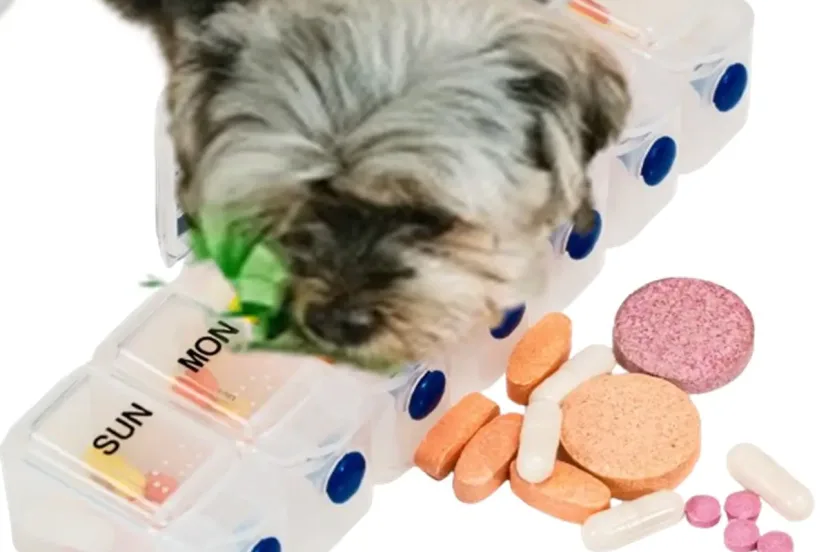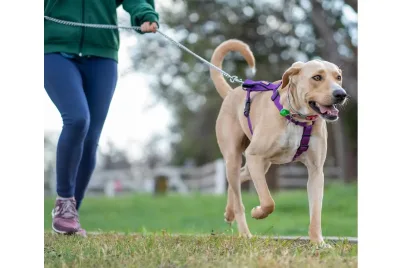Medication Poisonous to Dogs: Deadly Dangers Demystified
Imagine your dog happily playing, then suddenly limping. Naturally, as any parent, you want to help, but reaching for your trusted human pain reliever isn’t the answer. Administering human medication, even if it’s over the counter, could spell disaster for your furry friend. It’s a common misconception that what’s safe for humans is safe for dogs too, but that’s far from the truth. Many over the counter (OTC) and prescription medications that we use daily can be harmful or fatal to our canine companions. Our furry friends metabolize drugs differently than we do. This results in a medication poisonous to dogs instead of being helpful. While vets may use human meds, the dosages vary significantly.
It’s no wonder that human meds top the list of pet poisonings. Human medications pose a significant risk to dogs, accounting for almost half of all calls received by Pet Poison Helpline®. This statistic sheds light on the prevalence and seriousness of the issue of medication poisonous to dogs. Whether it’s prescriptions, OTC, vitamins or supplements, it’s critical to safeguard your dog.
Dogs can also get into our medications accidentally. Whether it’s a pill dropped on the ground, innocent curiosity leading a dog to chew into a pill bottle, or medications accessible in bedrooms, kitchens and bathrooms. Another example is a caring pet parent mistakenly administering human medication meant for themselves. These are common situations when medication poisonous to dogs become a harsh reality, creating significant risks to our furry friends.
We aim to shed light on the critical issue of medication poisonous to dogs, in this blog post. Topics covered include medication poisonous to dogs, symptoms of medication poisoning, preventive measures, and what to do in case of an emergency.
Medication Poisonous to Dogs
Medication can prevent, cure and manage minor ailments or serious disease. Imagine this: what could be a lifesaving medication for humans might spell disaster for our furry companions. Surprisingly, even a small amount of certain medications can wreak havoc on pets’ health.
The following are common human medication poisonous to dogs. These reflect some of the most frequently ingested human medications by dogs, however is not every potential medication poisonous to dogs.
NSAIDs
While safe for humans, NSAIDs (non-steroidal anti-inflammatories) can cause severe harm in dogs with just a pill or two. Dogs can suffer from stomach ulcers, intestinal damage, and even kidney failure. Once ingested, NSAIDs are quickly absorbed, reaching peak levels in the bloodstream within hours. Side effects include gastrointestinal issues and damage to the digestive tract. Common NSAID pain relievers include ibuprofen or naproxen.
Acetaminophen
While acetaminophen like Tylenol is safe for humans, it’s dangerous for dogs. Even in small amounts, it can cause liver failure and, in larger doses, harm red blood cells.
Antidepressants
Antidepressant drugs are occasionally prescribed for dogs; however they can cause severe neurological issues like sedation, tremors, and seizures in large dosages. Additionally, they may elevate heart rate and blood pressure, posing serious risks. Just one human dosage pill can lead to poisoning in dogs.
ADD/ADHD medications
It’s serious if your dog ingests ADD/ADHD medications. Stimulants like methylphenidate and amphetamines, contained in ADD/ADHD medications, pose life-threatening risks, inducing seizures, high body temperature, and heart issues in pets.
Sleep Aids
Sleep aid medications are designed to calm humans however, dogs react differently. Dogs may get agitated instead of relaxed, experiencing lethargy and coordination issues.
Birth Control Pills
Many dogs find the packaging of birth control pills alluring. Small amounts usually don’t harm, but large doses can lead to bone marrow issues. Female dogs not spayed face higher risks of estrogen side effects.
High Blood Pressure Medication
ACE or Angiotensin-converting enzyme inhibitors
ACE or Angiotensin-converting enzyme inhibitors are occasionally prescribed by Veterinarians for treatment to dogs. The dosage prescribed by a Veterinarian is completely different from a human dosage.
High or overdoses might lead to low blood pressure, dizziness, and weakness in dogs, however these medications are usually safe. Small doses may just need home monitoring, unless your pet has kidney or heart issues.
Beta-Blockers
Beta-Blockers treat high blood pressure in humans. Even a tiny bit of a Beta-Blocker medication can cause serious issues like dangerously low blood pressure and a slow heartbeat in dogs.
Thyroid Medications
The dosage of Thyroid medication that dogs need is much higher than ours. It’s usually not a major concern if your dog gets into your Thyroid medication, however excessive doses can cause jitters, panting, or aggression.
Statins / Cholesterol lowering medication
Ingestion of statin medications by dogs can cause mild vomiting or diarrhea as a result of one-time consumption. Long-term use can cause serious side effects including muscle breakdown, liver and kidney damage.
Vitamins and Supplements
We often take supplements and vitamins to ensure we get enough essential nutrients as prevention as well as maintain our health. Our dogs might not handle these supplements and vitamins so well. Whether it’s the active ingredient or just the fillers, these supplements can be poisonous or fatal to our beloved pets. Do not assume a dog will just pee out the unused vitamins – that’s a harmful, incorrect myth!
Iron supplements are commonly used by humans to address deficiencies, they pose risks to our dogs. High doses of iron can irritate the gastrointestinal tract, causing vomiting and diarrhea in dogs. Dogs and experience liver damage due to excessive iron intake.
Vitamin D3, crucial for humans due to dietary deficiencies and sunlight exposure, poses risks for our pets when overdosed. Excessive Vitamin D intake in dogs can result in symptoms like vomiting, diarrhea, and loss of appetite. Furthermore, elevated calcium levels from high doses may cause kidney damage and soft tissue mineralization.
Alpha lipoic acid or thioctic acid, is an antioxidant used to decrease inflammation, slow skin aging, slow memory loss, improve nerve function, reduce blood sugar and lower heart disease risk factors. If your furry friend gets into thioctic acid, watch out for signs like drooling, vomiting, and shaky legs. These symptoms can show up within hours. Without treatment, it could be deadly, however with prompt vet treatment most dogs recover.
Coffee and caffeine are toxic to dogs. While humans might turn to coffee extracts and supplements for a metabolic boost or extra energy, for our furry companions, it’s a different story. If dogs get into these supplements, they might experience vomiting, restlessness, and increased thirst. High doses can even lead to severe consequences like seizures or death.
Xylitol, the sweetener commonly found in sugar-free products, is toxic for dogs. This substance, now prevalent in many supplements, particularly chewable ones, poses a severe threat to our furry friends. When ingested by dogs, xylitol can lead to a rapid drop in blood sugar levels and cause serious liver damage. So, it’s essential to keep all xylitol-containing supplements out of your pet’s reach to prevent any accidental ingestion and potential harm.
Symptoms of Medication Poisoning
Symptoms of medication poisonous to dogs vary based on age, size, breed, and how much of the medication they have ingested. These factors lead to diverse reactions in dogs.
Common medication poisoning symptoms that pet parents need to be aware of include:
Gastrointestinal signs
- Vomiting
- Diarrhea
- Drooling/hypersalivating
- Inappetance
- Nausea
Internal bleeding
- Coughing of blood
- Vomiting blood
- Pale gums
- A racing heart rate
- Weakness or lethargy
- Collapse
Kidney failure
- Halitosis (concerning dog breathe can like; ammonia, urine or even “fishy” when they exhale)
- Lack of appetite
- Vomiting
- Diarrhea
- Excessive thirst or urination
- Absence or decreased urination
Liver failure
- Jaundice/yellow discoloration to the gums
- Weakness or collapse secondary to a low blood sugar
- decreased level of alertness or consciousness, acting abnormally
- Vomiting
- Diarrhea
- Black-tarry stool
Preventive Measures
When it comes to your dog’s safety, it’s essential to handle all medications, whether over-the-counter, including supplements and vitamins, or prescribed medication, with utmost care. Dogs tend to explore their surroundings with their mouths, making it crucial to keep medications out of their reach. Stray pills, powders, or liquids left unattended can pose a serious threat to their health if ingested accidentally.
It’s a common misconception that certain human medications are safe for dogs, but this is not always the case. Before administering any medication to your dog, it’s imperative to seek guidance from a qualified veterinarian. They can provide tailored advice based on your pet’s unique needs and medical history. To safeguard your canine companion, ensure medications are stored securely, and never hesitate to contact your vet if you suspect your dog has ingested something harmful.
Countertops and nightstands might seem like out-of-reach spots, but dogs have their ways. Some are master climbers, and others can chew through just about anything! Even those so-called child-proof containers aren’t dog-proof. Our four-legged pals can be quite resourceful when it comes to getting into things they shouldn’t. So, always keep your meds locked away securely, far from curious noses and adventurous paws.
A secure cabinet or drawer is your best option for storing medication. But if your furry Einstein can outsmart your storage solutions, it’s time to level up. Child-proof locks can be a game-changer, making sure those pills stay off-limits to curious noses and playful paws.
Plastic baggies might seem convenient, but they’re no match for a determined doggie. Those flimsy plastic pouches won’t stand a chance against those sharp teeth and playful antics. Choose a sturdier option keep to your meds secure and out of reach, as well as that can withstand a curious nose or two.
A common household hazard for our furry friends is the garbage can. Imagine your dog, with their keen sense of smell, sniffing out something interesting in the garbage. It’s like they’re on a treasure hunt, but the loot they find could be dangerous meds. Never toss medications into the garbage where they’re within paw’s reach. Choose a safer disposal method, such as through your local pharmacy Take-Back program.
It’s important to consider where and how you take your meds as a preventative measure to keep your dog safe. Taking your medications in a designated area ensures that there is a clear distraction free area, so if a pill escapes, you’re in a controlled environment where you can quickly deal with the situation. A great strategy is to take medications over a sink or open drawer. Because if you drop a pill, or powder or liquid spills it’s contained, easier to find clean up, and most importantly inaccessible to your dog.
Pill organizer containers are convenient for keeping track of medications. However, those containers might look like fun toys to your furry pals. It’s crucial to store containers in a secure cabinet that your dog can’t get into. This way, you prevent any accidental chew sessions and keep your dog safe from potential harm.
Storing your dog’s meds away from your medications helps to make sure that you don’t mistakenly give the wrong meds to wrong family member, furry or otherwise!
What To Do in Case of an Emergency
If you suspect your dog has ingested something they shouldn’t have, whether it’s a stray pill or a lick of something suspicious, swift action can be a lifesaver. Time is of the essence, especially when it comes to pet poisonings.
Remain calm.
Call your Vet first – they know your dog best. Your Veterinarian will guide you through the best course of action, whether it’s handling things at home and what to do, bringing into their clinic or taking them to the nearest emergency Veterinarian Clinic. Your pet’s safety is top priority, don’t second-guess yourself and don’t rely on Dr. Google.
If your veterinarian is not available contact:
The Pet Poison Helpline is available 24/7 by calling (855) 764-7661.
You can also call the ASPCA Animal Poison Control Center at 1-888-426-4435 for guidance.
Immediately take your dog to the nearest emergency Veterinarian Clinic.
Conclusion
Ensuring our furry companions stay safe from medication poisonous to dogs is paramount for responsible pet ownership. From storing medications securely in cabinets or drawers to never underestimating a dog’s ingenuity in reaching seemingly inaccessible spots, every precaution counts. Remember, what’s safe for us may not be safe for them, so always consult your vet before administering any medication to your pet.
Should an emergency arise, swift action is crucial. Stay calm, contact your vet immediately for guidance tailored to your pet’s needs, and consider reaching out to pet poison hotlines or emergency veterinary clinics for further assistance. By taking these preventive measures and knowing what steps to take in case of an emergency, you can help keep your beloved furry friend safe and healthy for years to come.
FAQs
Q1.: Are all human medications safe for dogs?
A: No, not all human medications are safe for dogs. Many over-the-counter and prescription medications can be harmful or fatal to dogs due to differences in metabolism.
Q2.: What are the most common symptoms of medication poisoning in dogs?
A: Common symptoms of medication poisoning in dogs include vomiting, diarrhea, drooling, lethargy, lack of appetite, pale gums, jaundice, seizures, and collapse.
Q3.: How can I prevent my dog from accessing medications accidentally?
A: To prevent accidental access to medications, store them securely in cabinets or drawers out of your dog’s reach. Avoid leaving pills or liquids unattended and consider using child-proof locks on cabinets.
Q4.: What should I do if I suspect my dog has ingested something harmful?
A: If you suspect your dog has ingested something harmful, remain calm and contact your veterinarian immediately for guidance. You can also call pet poison hotlines or take your dog to the nearest emergency veterinary clinic.
Q5.: Can I administer human medication to my dog in case of an emergency?
A: It’s not advisable to administer human medication to dogs without veterinary guidance. Human medications can have different effects and dosages for dogs, so it’s essential to consult a vet for proper treatment.




